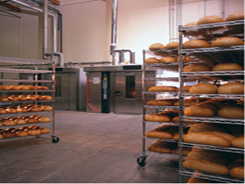NCDC offers assistance in five different service areas of cooperatives (retail, worker, producer, service, and housing). These five service areas offer different services and benefits engineered to fit a specific need for the members/owners of the cooperative. We also offer information on cooperative entities.
1) Retail Cooperatives
Retail Cooperatives are a type of "consumer cooperative" which help create retail stores to benefit the consumers making the retail “our store”. They allow consumers the opportunity to supply their own needs, gain bargaining power, and share earnings. They are organized as communities, or other “local groups”, owning their own retail stores. Retail cooperatives are often found in small communities where local businesses have shut down. Examples: hardware, food, agriculture products, and even movie theaters.
2) Worker Cooperatives

Members of worker cooperatives are both employees of the business as well as owners of the cooperative. This is one of the fastest growing segments of cooperatively owned businesses. Possibilities for being organized as a worker cooperative include: New business start-ups, entrepreneurs sharing highs & lows of business, or a conversion of existing businesses. Examples: bakeries, retail stores, software development groups, and aquaculture.
Larger companies also have the option of Employee Stock Ownership Plans (ESOPs). This means employees will own a stake in the business, allowing for similar types of democracy in the workplace. For more information on worker cooperatives, US Federation of Worker Cooperatives website.
3) Producer Cooperatives
Producer cooperatives are created by producers and owned & operated by producers. Producers can decide to work together or as separate entities to help increase marketing possibilities and production efficiency. They are organized to process, market, and distribute their own products. This helps lessen costs and strains in each area with a mutual benefit to each producer. Examples: agricultural products, lumber, carpentry and crafts.
4) Service Cooperatives
Service cooperatives are a type of "consumer cooperative" which help to fill a need in the community. They allow consumers the opportunity to supply their own needs, gain bargaining power, and share earnings. They are organized to give members more control over the services that are offered. Examples: service co-ops such as child care, health care clinics, and funeral services.
5) Housing Cooperatives
Housing cooperatives are a type of service cooperative which provide a unique form of home ownership. They allow homeowners the opportunity to share costs of home ownership (or building). They are organized as an incorporated business formed by people who wish to provide and jointly own their housing. The units in a housing co-op are owned by the cooperatives and cannot be sold for profit. Examples include: condominiums, rentals, single-family homes, market rate, and limited equity.
For more information on the benefits and structures of housing cooperatives check out this Housing Cooperatives PDF by the University of Wisconsin Center for Cooperatives.